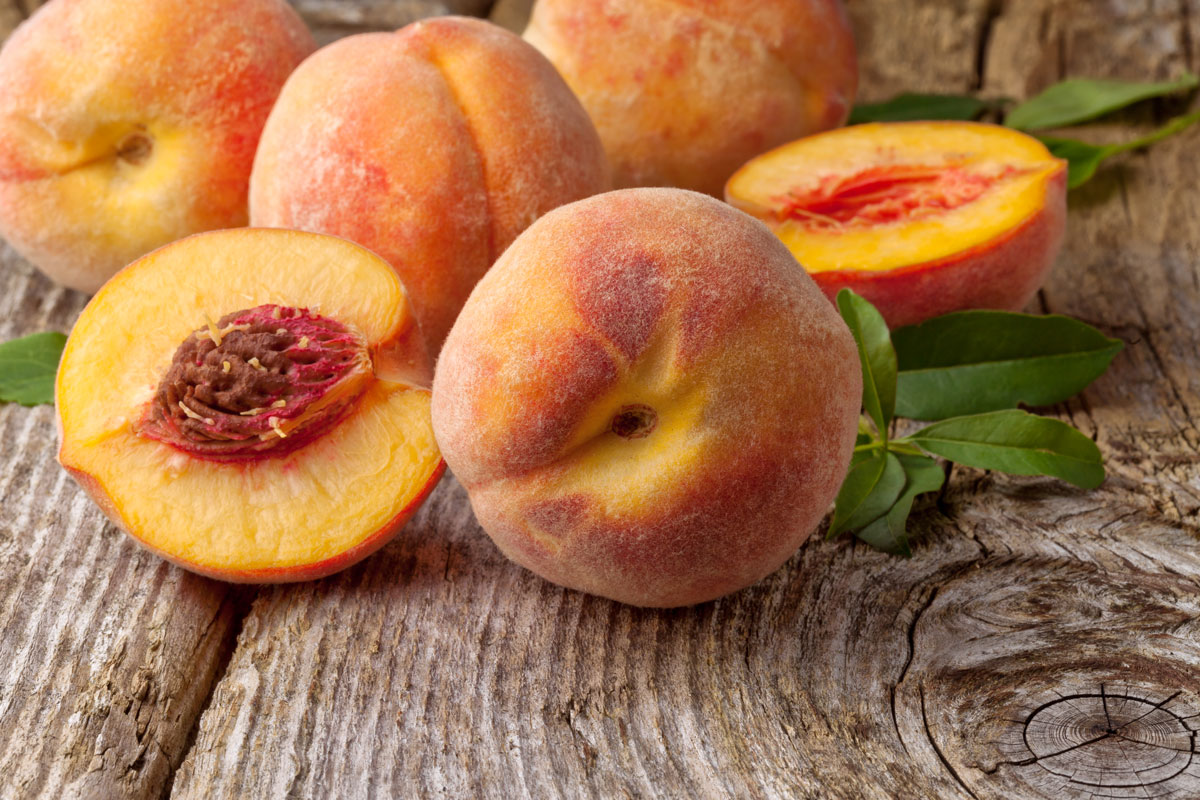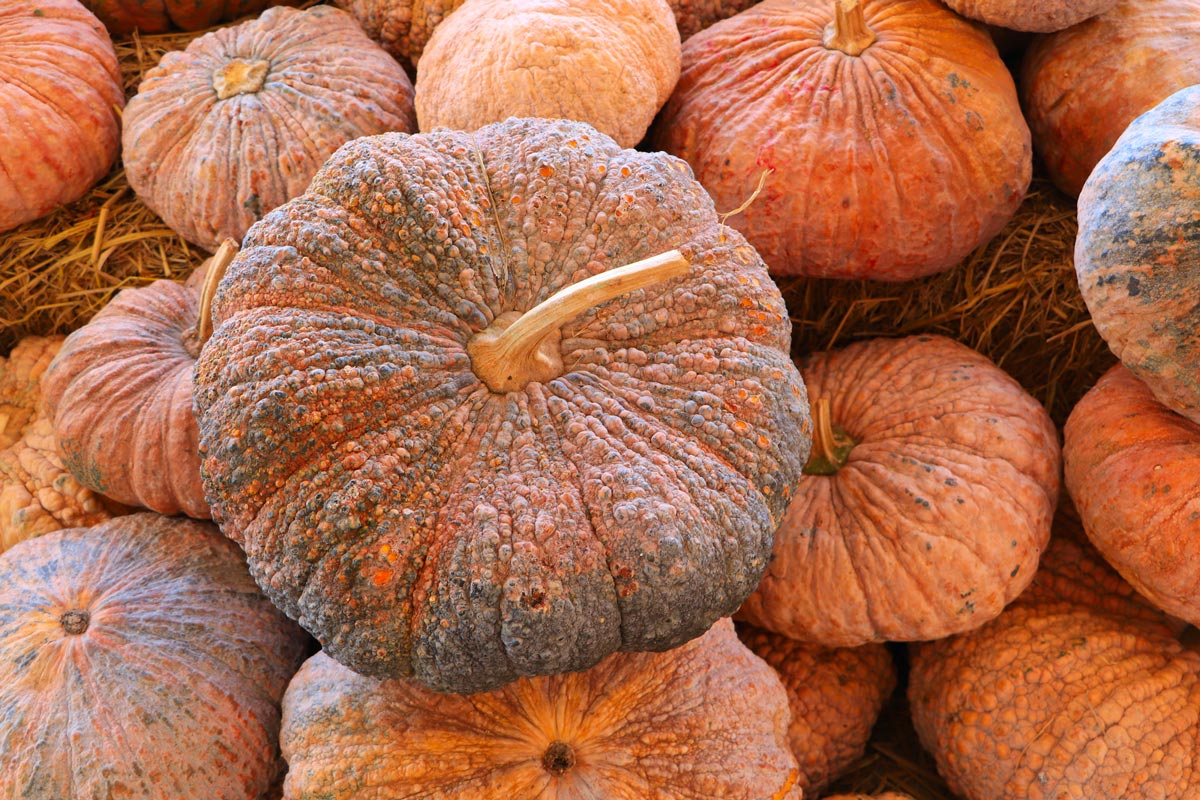What is a working bee, and how can we utilize these methods of community and productivity in our own lives? Let’s dive in and discuss what they are, why they’re beneficial and how you can start one in your community today.
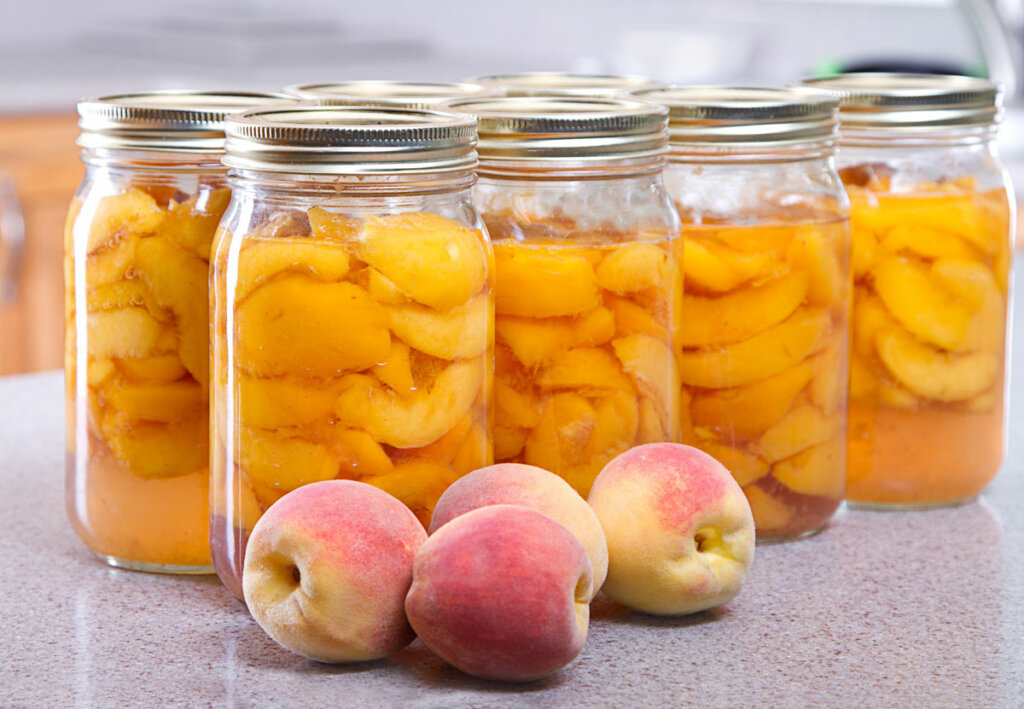
Table of Contents[Hide][Show]
Why I Love This Topic
Working bees, where we come together with a group of people to share the workload and the bounty, are a lost art in today’s modern world. But you all know that I claim to be a modern pioneer. So I’m always looking to these lost practices to find out how they can fit into our modern lifestyle.
As a child, I remember my aunt coming over and cooking dinner with my mom to share the workload. They would cook, eat and clean up together.
Both women needed to cook dinner for their family, so they shared in the task together to lessen the task, foster their relationship, and make the task much more enjoyable.
Even more so in today’s society, these working bees are pivotal in passing along skill sets and helping to support one another in various aspects of life.
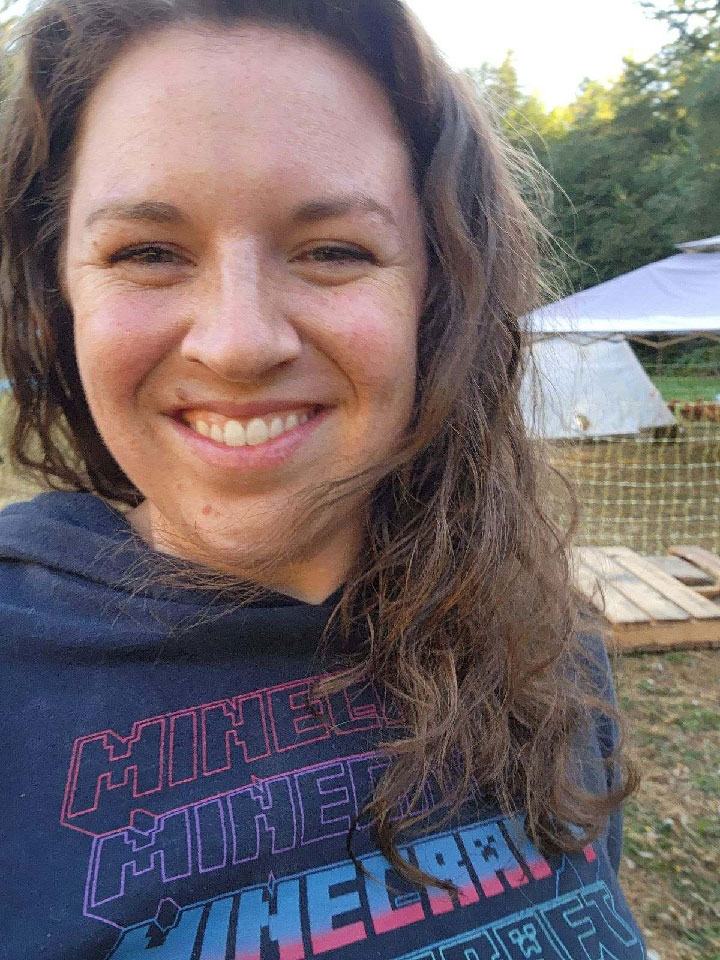
Andrea from Ancestral Kitchen
Andrea Huehnerhoff is the co-host of the Ancestral Kitchen Podcast, and she lives locally with me here in the Pacific Northwest. She’s passionate about teaching ancestral skillsets to the next generation by utilizing the lost art of working bees.
Andrea is most passionate about canning bees (more on that below) but also loves a good freezer cooking bee or cleaning bee. What she loves most is the incredible time spent with the community, building relationships, and gleaning from the women around her.
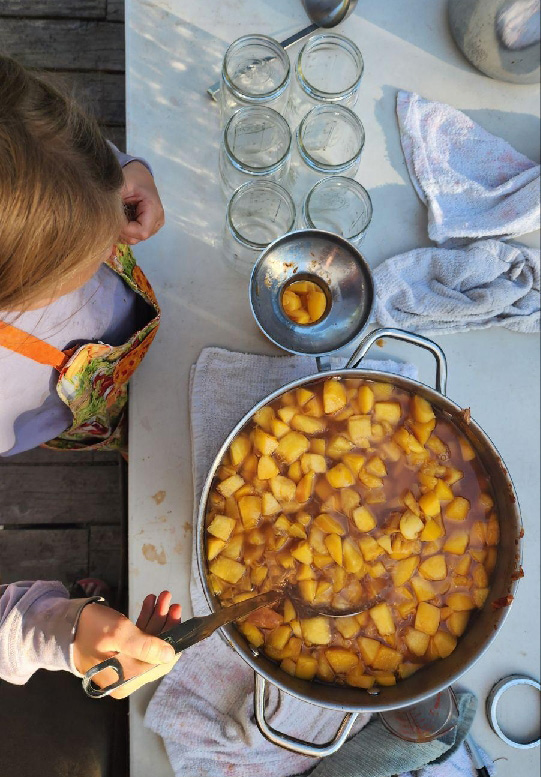
What is a Working Bee
A working bee is a group of people coming together to share the workload and to complete a large project or task, then share in the bounty or reward.
A working bee can take on many different forms. But in general, the main purpose is to complete a large task with many hands (which makes light work).
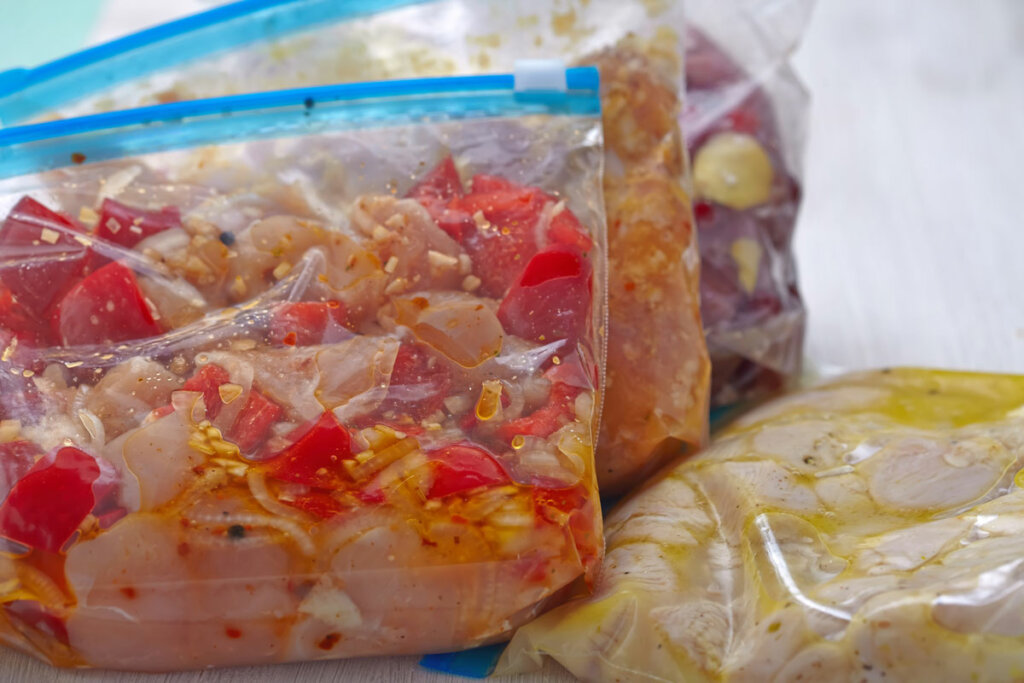
Types of Working Bees
- Canning Bee – Take a large canning project (like canning peaches discussed below) and divide the tasks among many participants to help make the job move faster.
- Cleaning Bee – How about gathering a large group of women and going from house to house, spending a couple of hours at each house, but with multiple sets of hands, much more cleaning takes place in those two hours.
- Cooking Bee – Have you wanted to stock your freezer full of meals? Consider having a cooking bee where a group of friends gather together and bulk prep multiple meals to stock the freezers.
- Baby Bee – A baby bee is similar to a cooking bee, however, instead of stocking your own freezer with meals, you’re stocking the mom-to-be’s freezer with meals that she can use after the baby comes.
- Gardening Bee – Perhaps you’re not quite ready to have your own garden, or maybe you lack the space. You can go in with others to create a community garden and everyone works together to grow and harvest food.
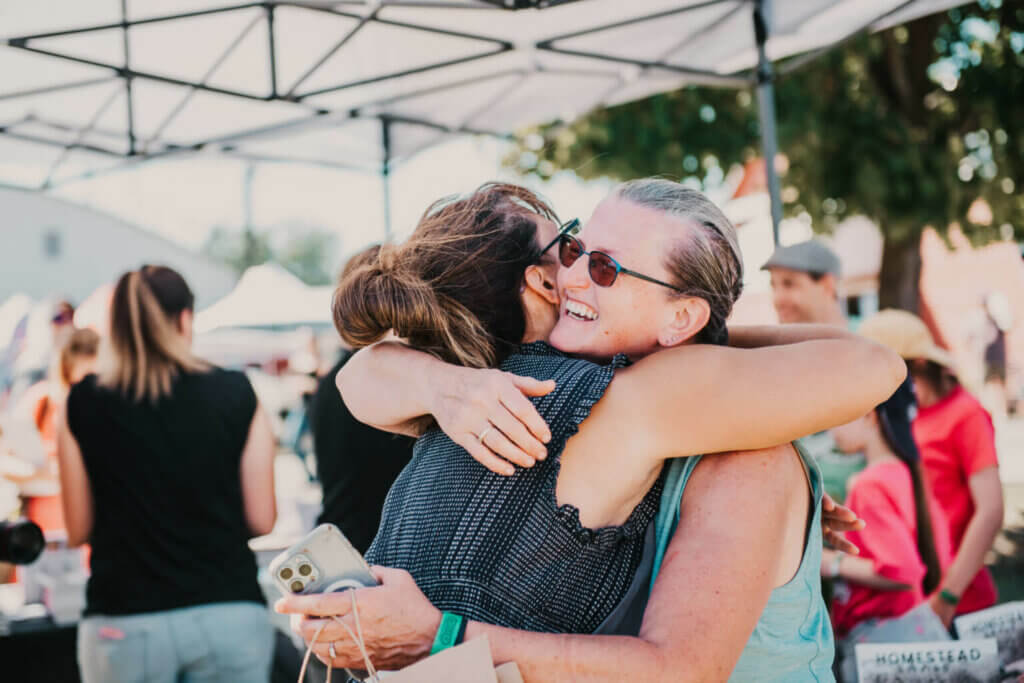
How Working Bees Are Beneficial
Andrea shares that she’s been involved in many types of working bees. One that she shared about was a four-day marathon of canning plums. After the canning bee her dad asked her why on earth she spent so much time and energy to preserve plums. This was her opportunity to share about the group of women and what the time spent together meant to her.
The group was made up of women in all different stages of life (some young and newly married, some in the toddler stage of life, and some empty nesters). Everyone was sharing their life experiences.
Where a woman was in the throes of raising teenagers, one woman with grown children was able to pass along her wisdom from parenting. The same went for those raising littles, homeschooling mamas, those trying to manage the home well.
Conversations went from sharing recipes to sharing faith, encouraging, laughing, crying, you name it. And after those four days were over, it wasn’t the work that was remembered, it was the time spent with community and the life lessons.
She recalls it being such a sweet time of gleaning from these women that it didn’t even feel like work!
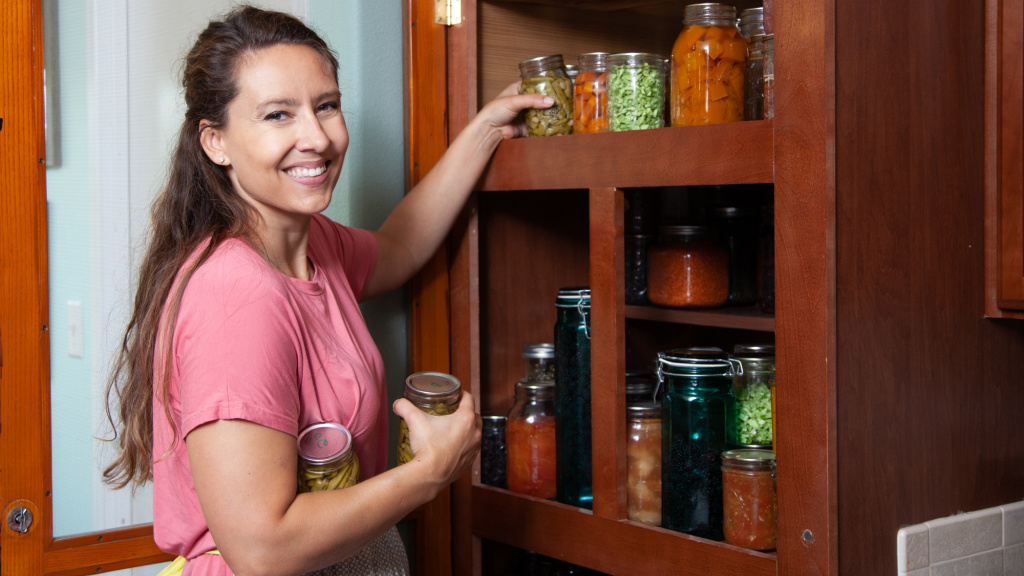
Setting Up Your Own Working Bee
If a working bee sounds as amazing to you as it does me, consider how you might go about setting one up.
Find Your Community
Andrea recommends looking for people with similar interests. She’s found people at her local milk drop/Azure drop and church groups. Think about where like-minded people gather and ask around.
We just had the first annual Modern Homesteading Conference here in the Pacific Northwest. Consider purchasing your ticket to next year’s conference now and follow us on Facebook and Instagram to connect with like-minded people who may be in your area.
At next year’s conference (2024) we’ll be opening up a time on Saturday where you can find people from your area to connect with.
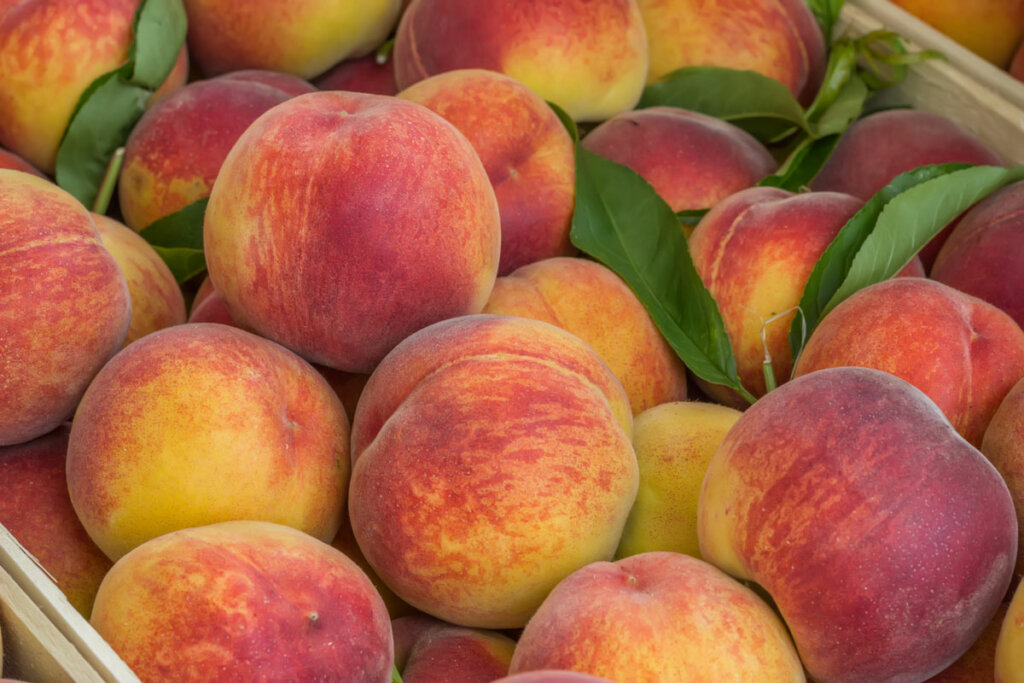
Consider the Logistics
If you’re planning a freezer cooking bee or a canning bee, there are some logistics to consider when setting them up such as supplies and ingredients.
Andrea gave the example of a peach canning bee where everyone decides ahead of time how many pounds of peaches they want to can, then one person fronts the cost of the peaches and places the order.
An alternative method is to collect all the money ahead of time and one person drives to pick up the peaches and pay the farmer or fruit stand.
No matter how you do it, it’s best to use a spreadsheet to keep track of it all!
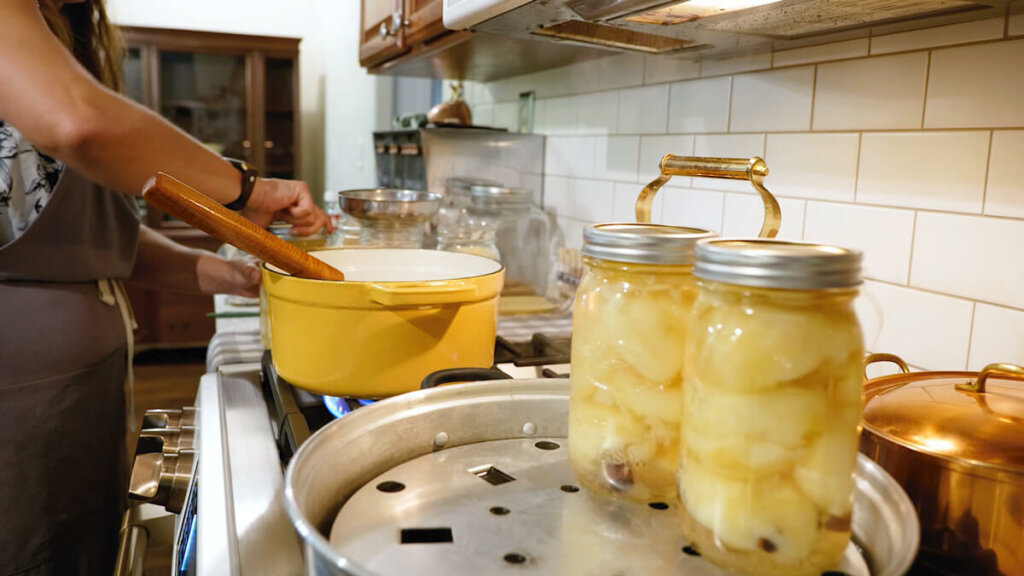
Supplies
Everyone is responsible for bringing their own canning jars/lids and canning equipment if they have it. Andrea’s tip is that the more canners and canning stoves you have going, the faster the projects will go.
The canning time tends to be where the bottleneck takes place with most canning projects.
It’s also a good idea to do these large canning days outside because canning peaches is a big juicy mess. Being able to hose the area down afterward is nice.
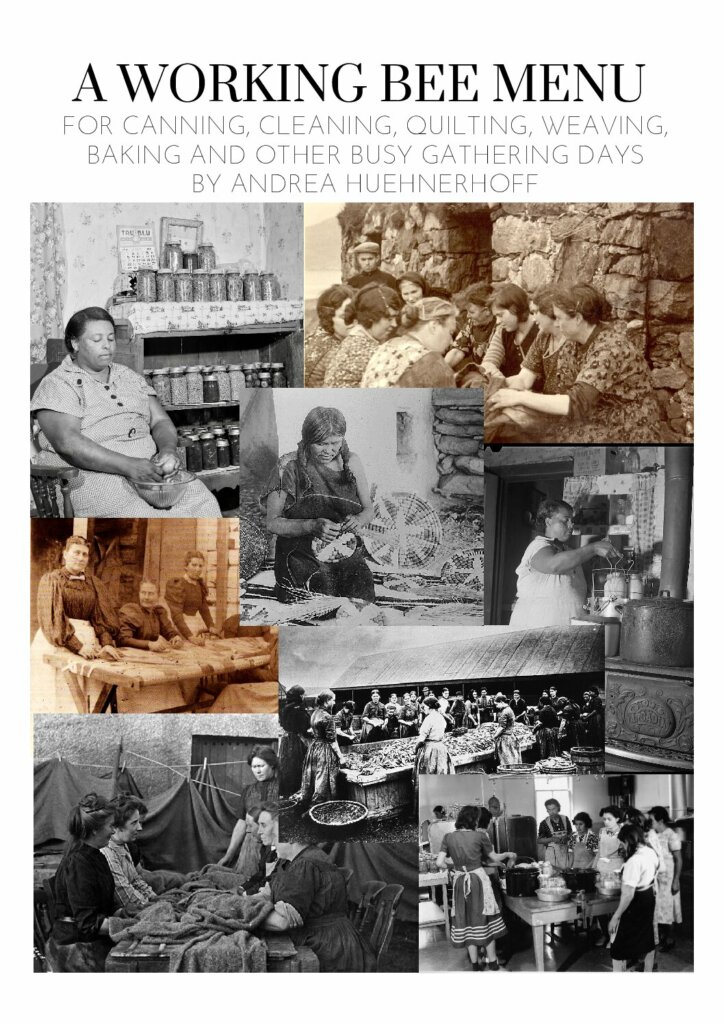
Food (Keep Them Fed!)
Don’t forget about food! Having well-fed bellies will keep everyone motivated to keep canning. The host can provide the food (maybe everyone brings their own beverages). It can be a potluck style. Or you can assign people different portions of the meal (snacks, main course, side dish, drinks, dessert).
Get creative! If all else fails, having a pizza delivery is always an option.
Andrea generously shared her “canning day breakfast casserole,” along with other meals that will feed a crowd in this handy FREE PDF.
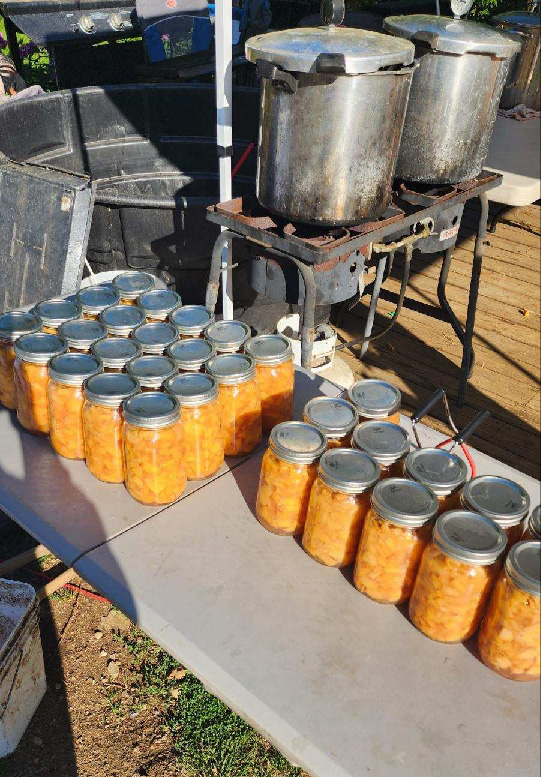
Share the Bounty
Since everyone is going in on this large project together, it’s important to make sure everyone gets their fair share of the bounty. Andrea shared a tip on how to know exactly how many peaches fit into each sized jar by doing a “test run.”
You can Google “how many peaches fit into a quart jar” however, not all peaches are equal in size. Google says, “A bushel weighs 48 pounds and yields 16 to 24 quarts, an average of 2 1/2 pounds per quart.”
As you can tell, 16-24 is a pretty big variance. Testing this out with a few jars first will help you determine how many jars to expect.
Knowing exactly how many jars of canned peaches each person should take home is best. Especially if someone has to leave early.
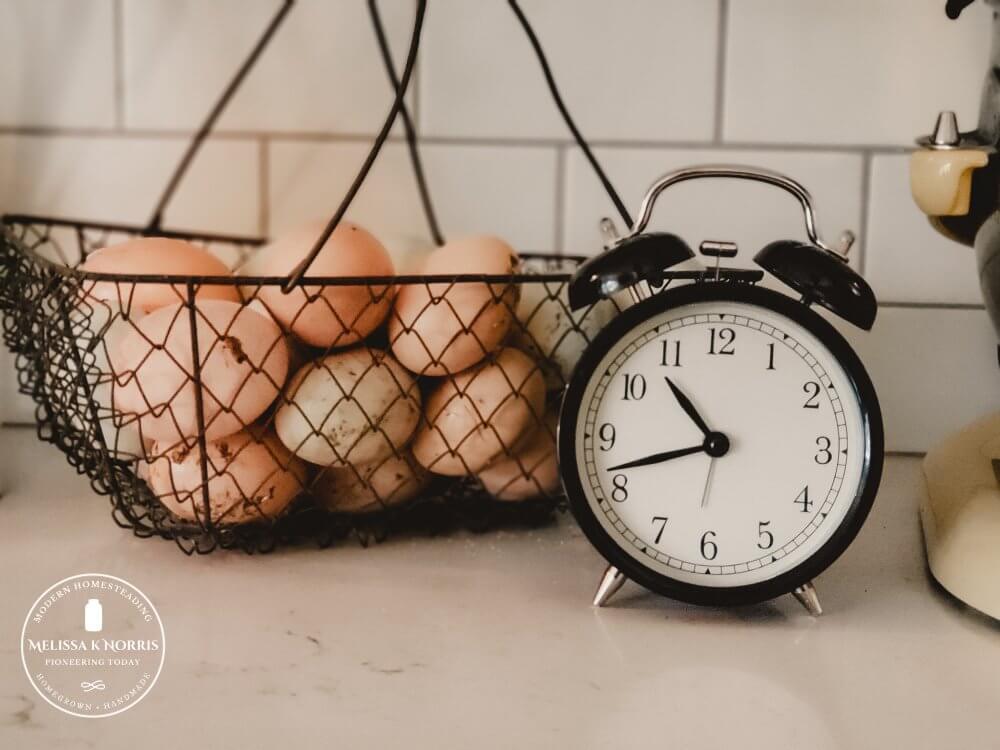
Set a Schedule
Plan out a loose schedule. Not everyone can pull all-nighters when it comes to canning marathons. For most of us, we need to plan these days ahead of time and fit them into our schedules.
Andrea’s general rule of thumb is to estimate about three times as long as you think the canning project will take! When she does this, she’s pretty much always accurate.
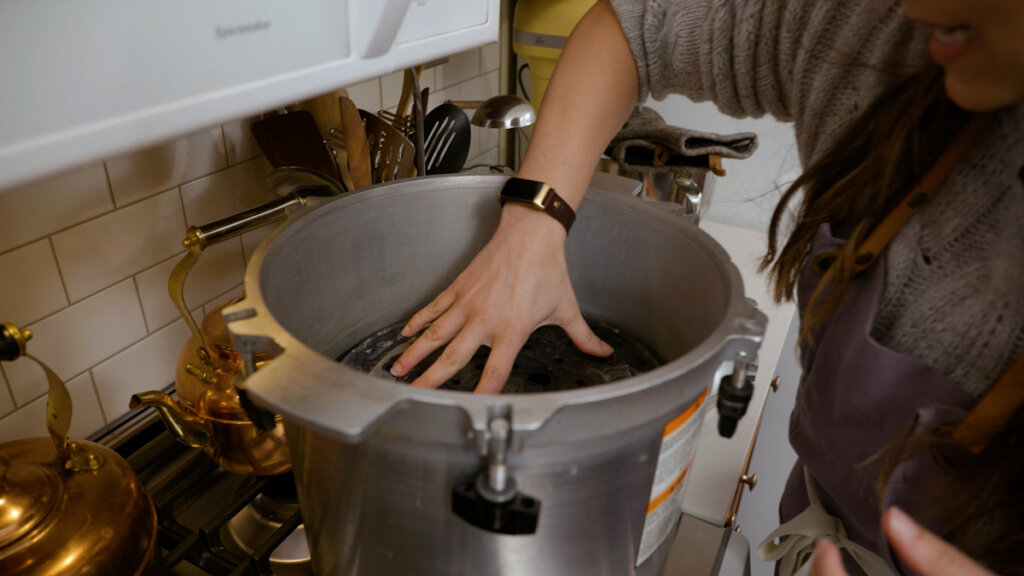
Get All Involved
Don’t forget to include your kids! This counts as home economics!
To set up your day, know how many people will be joining your working bee. Then, figure out how many “stations” you can have and work from there.
If there’s someone who doesn’t know how to can peaches, they may want to spend some time working at each station to learn the whole process. Someone else may be a canning pro who just wants to peel peaches the whole day.
No matter how you set it up, there’s no right way or wrong way. Do, however, consider those joining you and what they’ll be most comfortable with.
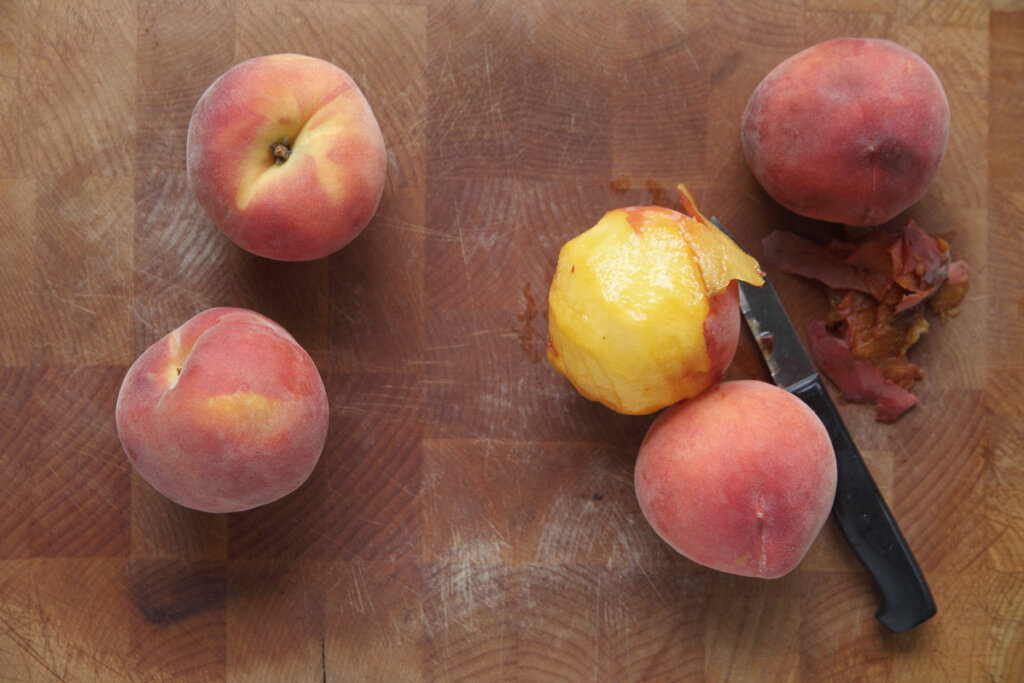
“Stations” for a Peach Canning Bee
- Washing – There are four possible washing stations for the peaches. This can be divided between four people or one, depending on how many people you have.
- Veggie Wash – First, the peaches get washed in a tub with a veggie wash, then passed to the next station.
- Rinse #1 – The peaches go through their first rinse. Because this water ends up being pretty sudsy, additional rinsing is necessary.
- Rinse #2 – The peaches go through their second rinse.
- Final Rinse – The peaches go through their third and final rinse. By this time the water shouldn’t be sudsy or cloudy, and the peaches are ready for processing. Pro Tip: Have a runner available who can dump and refill water, or take the peaches from one station to the next.
- Processing – There are a few steps necessary when processing peaches, so if you have enough people, these steps can be divided into stations.
- Blanching – First, a blanching station where someone is dumping the peaches into boiling water for 10-15 seconds, then dumping them into an ice water bath.
- Skinning – The next station has someone pulling the skins off the peaches.
- Halving – One person is set up to halve them and remove the pits (save the pits to make almond extract!).
- Jarring – The next station is where the peaches are stuffed into clean jars. (An additional station for jar cleaning could be set up, or everyone can be sure to bring clean jars, ready for processing.)
- Adding Syrup – One person ladles the syrup into each jar, measures the headspace and puts the lids onto the jars.
- Canning – Then there’s a canning station where the jars go into the canner, get processed and come out to rest.
As you can see, this canning bee could easily accommodate 10 women (plus some children to help as “runners”). However, if you have more women, that allows for breaks!
I hope this example helps you see just how simple a working bee can be, and how beneficial they are to us as relational beings. God created us for fellowship, let’s not forsake that… and why not accomplish something meaningful in the process!
Verse of the Week: Titus 2:3-4
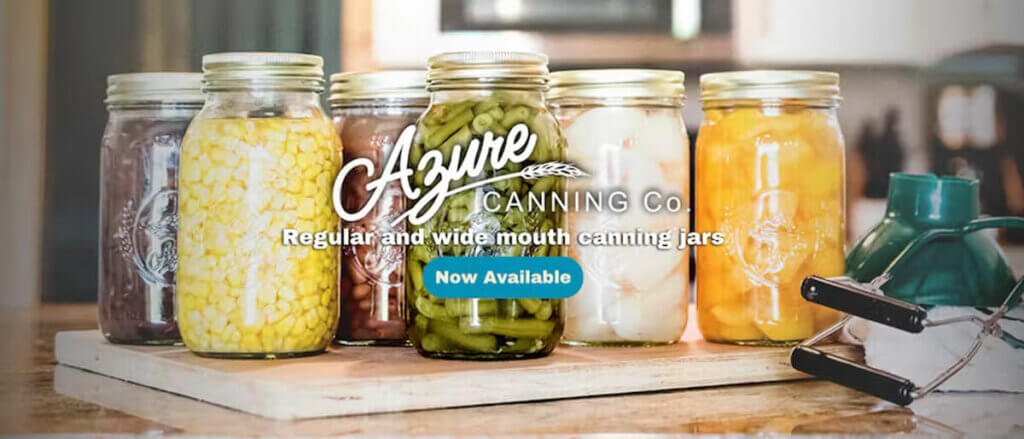
Azure Standard
My new favorite source for canning jars is Azure Standard. In 2023 they released their new canning line, Azure Canning Co. They sell regular and wide-mouth canning jars that come with Superb lids.
Azure Standard is the sponsor of this podcast. Right now, you can get 10% off your first Azure Standard order of $50 or more. Just use coupon code “Melissa10” at checkout.
Where to Find Andrea
If you’d like to find Andrea, you can listen to her on the Ancestral Kitchen Podcast. She is the co-host along with Alison (who lives in Italy). Together they talk about preparing foods directly from the farm. Including how to work with whole-food ingredients to incorporate them into your modern kitchen and lifestyle.
And catch my episode with Andrea on How to Run a Made-From-Scratch Homestead.
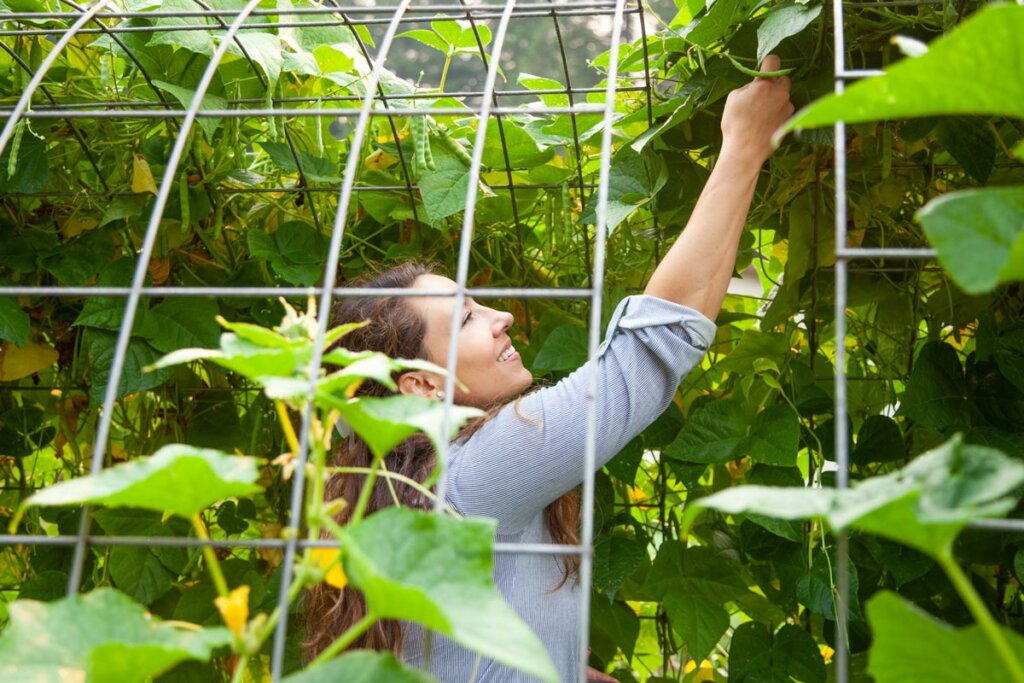
Other Posts You May Enjoy
- Time Management Skills for the Homestead
- Avoid Overwhelm – Choosing What’s Right for Your Homestead
- 17 Self-Sufficiency Tips from the 1940s & the Great Depression
- 13 Steps to the Simple Life Your Great-Grandparents Knew
- Pioneer Kitchen- 100-Year-Old Basic Kitchen Tools to Still Use Today
- 6 Things Our Great-Grandparents Did Better Than Us
- Homesteading for Beginners- 9 Transition Tips from City Life
- Our New 40-Acre Homestead Property
- Biggest Homestead Mistakes We Made & What to Avoid
- Community Sufficiency vs. Self-Sufficiency
- Month-by-Month Decluttering Schedule
[fusebox_transcript]
